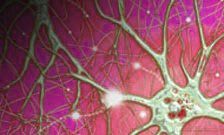Some years ago the BBC asked me to take part in a phone-in on Radio 4 about hearing voices. The programme was to take place immediately after the broadcast of a play about hearing voices written by Sara Maitland, a novelist and writer of non-fiction and short stories. The BBC was concerned that the play, which saw voice hearing in part as a spiritual experience and also related to the life story of the voice hearer, might raise “issues” for some listeners. I had offered Sara some advice about voices, so when the BBC sought her views she suggested they approach me for the phone-in. I arrived at the art deco palace that is Broadcasting House and was directed to the studio from which the programme would be broadcast. Sara was already there, and a woman whom I had never met before. The producer introduced us to each other; she was a senior nurse from the Maudsley Hospital’s psychosis unit.
On my way home I heard voices in my head, and I realised I was over-hearing a discussion that might have taken place in the BBC when they were planning the programme.
‘Sara Maitland wants this guy Phil Thomas in the phone-in.’
Who is he?’
”I googled him. He’s a critical psychiatrist.’
‘Never heard of him. Don’t you mean an antipsychiatrist? I thought they all died off with Laing way back in the eighties?’
‘No, critical psychiatry. They’re a group of British psychiatrists. They work in the NHS.’
‘Hm, he sounds too edgy. We need to balance him; let’s get someone from the Institute of Psychiatry.’
Of course, the BBC is a public broadcaster and has a duty to ensure fair coverage, especially in contentious areas like politics, or football (what Americans call “soccer”). And here lies the problem. The English do not see psychiatry as contentious. There may be disagreements between the proponents of this theory or that theory, but in general they are happy to leave this to the experts. That’s the nature of scientific debate and progress.
So, why did the BBC consider it necessary, in the interests of balance, to involve a senior nurse from a top unit specializing in the treatment of ‘treatment resistant schizophrenia’ to appear on the phone-in? Oddly enough we got on amicably, and broadly agreed about the importance of understanding voices, grappling with their personal meanings, and the value of peer-support groups like the Hearing Voices Network in coping with the experience. What I took away from my unexpected encounter with the senior nurse was that it had more to do with confusion in the BBC’s mind about the status of psychiatry as science. It felt as though they thought that there was something not quite right about saying that many people believed the experience of hearing voices was to do with their life stories, or a deeply spiritual experience. It was like swearing in front of the vicar.
There is a view that the BBC simply reflects the public voice. If that is so, then this is a voice that fails to grasp the reality that psychiatric knowledge is contested, and the cracks in the biological fortress behind which many psychiatrists hide grow wider each day. The scientific, or technological paradigm, is crumbling. Many people inside and outside the profession are raising serious questions about its value. In a recent series of book reviews (1,2) Marcia Angell, former editor of the New England Journal of Medicine, has attacked the orientation and practice of modern psychiatry. The development of Diagnostic and Statistical Manual (DSM) 5 has been severely criticized by the chair of the DSM IV task force (3). Like other biologically based research, molecular genetics has not fulfilled its promise (4). Recent work challenges the idea that differences in brain volume between people with or without a diagnosis of schizophrenia, reflect a fundamental biological difference; quite the opposite, these differences may be related to the use of neuroleptic drugs (5, 6, 7). Technological theory and practice in psychiatry is mired through its associations with the pharmaceutical industry’s marketing strategies (8).
But dear old Auntie, our cosy colloquialism for the BBC, remains anxious not to offend ‘scientific’ psychiatry. In early November 2011, Professor Sir Robin Murray, Professor of Psychiatric Research at the Institute of Psychiatry, was granted a five-minute slot on BBC Radio 4’s Today programme, (its flagship news and current affairs programme – the Prime Minister is fortunate to be granted six minutes), to mark the launch of the Schizophrenia Commission. Sir Robin is setting this up with the help of Rethink, a leading mental health charity here in England. They claim they want to give people in the country a chance to have a say about schizophrenia. However, the last sentence of Sir Robin’s interview gives the game away: ‘We’re not expecting a lot more money, sadly…but I hope now that the brain is open to investigation, and now we can image what’s going on in the brains of people with schizophrenia, then this is the time to put money into research to understanding exactly what’s going wrong.’
Now we have it! Now perhaps you can see what I mean by English madness, this anxious collusion between the voice of the people and ‘scientific’ psychiatry. For fifty years the research councils have squandered huge sums of money in a fruitless search for the biological basis of schizophrenia. Latterly, the drug companies have taken over this role, turning scientific inquiry into a global marketing opportunity. But in England, dear old Auntie continues to peddle the myth of neutral psychiatry, the voice that no one dares to challenge. Our economies are shrinking; the research councils’ grants are being cut, even Pharma is cutting back on neuroscience research, so the BBC grants the Professor of Psychiatric Research at the Institute of Psychiatry an opportunity to campaign for funds in the guise of giving the people a voice about schizophrenia.
One might be forgiven for believing that the grand-sounding Schizophrenia Commission (9) is an official government body. It isn’t. It consists of a hand picked group of thirteen people, including two service users with diagnoses of schizophrenia or schizo-affective disorder, and two Black people, one of whom has schizo-affective disorder. Although its terms of reference seem innocent enough, a curious little graphic says a great deal. For whatever evidence is considered by the Commission it is difficult to avoid the conclusion that the background context, the shared assumptions of those involved in the exercise, is that schizophrenia is primarily a brain disorder.
Watch this space!
References:
1. Angell M. The illusions of psychiatry. The New York Review, 2011, July 14th. Accessed at: http://www.nybooks.com/articles/archives/2011/jul/14/illusions-of-psychiatry/?pagination=false on 6th Feb 2012
2. Angell M. The epidemic of mental illness: why? The New York Review, 2011, June 23. Accessed at: http://www.nybooks.com/articles/archives/2011/jun/23/epidemic-mental-illness-why/ on 6th Feb 2012
3. Frances A. The first draft of DSM-V: if accepted, will fan the flames of false positive diagnoses. BMJ 2010; 340: c1168.
4. Turkheimer, E. Commentary: Variation and causation in the environment and genome. International Journal of Epidemiology 2011; 40: 598-601.
5. Lieberman, J. et al (2005) Antipsychotic Drug Effects on Brain Morphology in First-Episode Pychosis. Arch Gen Psych, 62, 361-370.
6. Ho, B-C et al. (2011) Long-term Antipsychotic Treatment and Brain Volumes: A Longitudinal Study of First-Episode Schizophrenia. Arch Gen Psych 68, 128-137.
7. Moncrieff, J. & Leo, J. (2010) A systematic review of the effects of antipsychotic drugs on brain volume. Psych Med, 40, 1409-1422.
8. Carey B. Harris G. Psychiatric group faces scrutiny over drug industry ties. The New York Times 2008; July 12th. Available at: http://www.nytimes.com/2008/07/12/washington/12psych.html?pagewanted=all
9. http://www.schizophreniacommission.org.uk/
















A superb piece, thanks Phil, I like your bit “On my way home I heard voices in my head” for it’s that inner dialogue that forms my thinking and keeps me sane, or what is normal for me anyway.
I attended the Soteria Network conference in Derby last November and enjoyed your workshop with Pete Sanders on ‘Phenomenological and humanistic approaches to psychosis’
http://www.soterianetwork.org.uk/conference/index.html
In Scotland I think there are the same tensions between psychiatry and the user voice. I’d like to see the ‘survivor’ terminology being used here but they prefer the umbrella term of ‘service user’, incorporating those of us who have recovered and don’t need services. I’m now on national mental health groups, in the hope of influencing change and because of getting fed up locally with the tokenism, or maybe that the process of change is too slow.
I look forward to checking our your references,
Regards, Chrys
Report comment
Hi Chrys
the tension you refer to between psychiatry and survivors / service voices is at the heart of the struggle for a more democratic psychiatry, if such a thing is possible, and I know well that Thomas Szasz would regard such a term as a paradox. The social reality is that In Britain, and vast swathes of the US, most people have no choice. They have to use mental health services. For this reason the onus is on psychiatrists to engage with those voices, even if they find it difficult to face up to what they have to say. Only then will tokenism end.
Thanks for your comments
phil
Report comment
John Sawkins
http://www.bbc.co.uk/i/b01bwmvt/
The Life Scientific: Robin Murray
http://www.bbc.co.uk
Psychiatrist Robin Murray on why he has changed his mind about the cause of schizophrenia…
Like · · Share · Tuesday at 11:12.
Susan Milligan likes this..
John Sawkins Psychiatrist decides to stop taking the piss (comparing the urine samples of schiziphrenics with that of “normal” people). reasonable balanced programme for a change. Slightly more acknowledging of social factors as opposed to the usual brain chemistry / genetics nonsense.
Tuesday at 11:15 · Like.
Report comment
Hi Philip,
I really enjoyed reading what you wrote, so well put.
It just seems incredibly frustrating that in this, the 21st century, the treatment of mental distress for the masses remains so brutally archaic and filled with ignorance on the part of the folk in positions of power. Of course, power in any form is a corrupting influence but you’d hope or like to think that those who train & go on to become mental health professionals would be more clued up as to how to deal with psychosis etc.
It seems to me that in the main these educated psychiatrists know nothing of the impact of social factors and human suffering on the development of the mind in human beings. It’s not rocket science! It’s really quite simple.
Hopefully, one day there will be a real breakthrough in treatment for survivors.
Kind regards,
Lucy Lee.
Report comment
Yes indeed, thanks for pointing Professor Sir Robin Murray’s recent media appearance out. He features almost as regularly on BBC Radio programmes as the furore over DSM-V. We had Peter Kinderman doing an excellent piece of the Today programme this morning, attacking DSM-V for medicalisation and the lack of a proper scientific basis, and it even featured on the Jeremy Vine (he of EggHead fame – a popular TV quiz programme) show on Radio Two (you can tell I work from home!). But are you, like me, still really confused about what Sir Robin really believes in important in terms of ’causes’ of ‘schizophrenia’? One minute he says its all due to living in cities and being a member of a diaspora (my word, not his), then it all comes down to cannabis and the brain. He’s a nice chap, but it’s difficult to know where he stands. Like so many people I think his intentions are honourable, but he does’t think through the wider cultural and social implications of scientific research in a contended field like psychiatry.
Report comment
And thanks, Lucy for your comment, which I fully agree with. It seems to me that one of the problems about professional identities, especially that of doctor or nurse, is that for the most part the assumption is that whatever you do is for the best. Doctors and nurses are seen to be honourable people fulfilling valued and important role; they do good, ergo they do no wrong. This makes it very difficult for health care professionals to be truly self-reflective, and it follows that honest and open relationships between doctors (psychiatrists especially) and critical survivor / service user / experts by experience are vital in helping professionals to be more honest. Never forget the prime injunction in the Hippocratic Oath is not ‘do goo’ but Primum Non Nocere – Above all else do no harm.
phil
Report comment
Well said, Phil. I enjoyed your piece, and I couldn’t agree more.
I absolutely love it where you say ‘On my way home I heard voices in my head.’ Be careful. People can get hospitalised for saying things like this. I can just see the headlines: ‘Former Psychiatrist Sectioned After Admitting To Hearing Voices.’
Years ago I had a conversation with a psychiatrist that went something like this:
‘Do you hear voices?’ Dr Shaw (not his real name) asked.
‘Not like what you mean. Not audible voices.’
‘Not audible voices? Well, what kind of voices do you hear?’
‘I don’t hear voices, but I mean sometimes your own thoughts are like voices, aren’t they? A kind of dialogue in your mind.’
‘Are they really?’ he said, looking interested.
I wished I hadn’t said that. Had it made me sound schizophrenic? I’d been taught at Sunday school to listen to the ‘still small voice’ of conscience, the God-part inside us. After the loss of my religious beliefs I’d perceived this ‘voice’ as a part of my thoughts, but I didn’t mean a ‘voice’ literally.
‘Everybody thinks that way at times, don’t they?’ I said nervously.
‘What way?’
‘That your thoughts are like voices inside you.’
A stony silence. Damn it, I was making it worse.
‘But I can’t hear them. I only mean ‘voices’ in a metaphorical sense,’ I said in a hoarse voice that ended in a whisper.
Report comment
A very interesting read…
Report comment